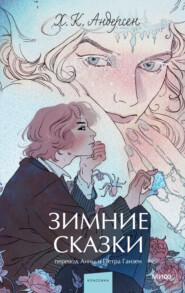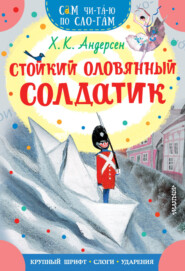По всем вопросам обращайтесь на: info@litportal.ru
(©) 2003-2024.
✖
Fairy Tales of Hans Christian Andersen
Настройки чтения
Размер шрифта
Высота строк
Поля
One evening, as he was sitting at home, there was a terrible storm going on outside; the rain was pouring down, but the old poet sat comfortably in his chimney-corner, where the fire was burning and the apples were roasting.
"There will not be a dry thread left on the poor people who are out in this weather," he said.
"Oh, open the door! I am so cold and wet through," called a little child outside. It was crying and knocking at the door, whilst the rain was pouring down and the wind was rattling all the windows.
"Poor creature!" said the poet, and got up and opened the door. Before him stood a little boy; he was naked, and the water flowed from his long fair locks. He was shivering with cold; if he had not been let in, he would certainly have perished in the storm.
"Poor little thing!" said the poet, and took him by the hand. "Come to me; I will soon warm you. You shall have some wine and an apple, for you are such a pretty boy."
And he was, too. His eyes sparkled like two bright stars, and although the water flowed down from his fair locks, they still curled quite beautifully.
He looked like a little angel, but was pale with cold, and trembling all over. In his hand he held a splendid bow, but it had been entirely spoilt by the rain, and the colours of the pretty arrows had run into one another by getting wet.
The old man sat down by the fire, and taking the little boy on his knee, wrung the water out of his locks and warmed his hands in his own.
He then made him some hot spiced wine, which quickly revived him; so that with reddening cheeks, he sprang upon the floor and danced around the old man.
"You are a merry boy," said the latter. "What is your name?"
"My name is Cupid," he answered. "Don't you know me? There lies my bow. I shoot with that, you know. Look, the weather is getting fine again – the moon is shining."
"But your bow is spoilt," said the old poet.
"That would be unfortunate," said the little boy, taking it up and looking at it. "Oh, it's quite dry and isn't damaged at all. The string is quite tight; I'll try it." So, drawing it back, he took an arrow, aimed, and shot the good old poet right in the heart. "Do you see now that my bow was not spoilt?" he said, and, loudly laughing, ran away. What a naughty boy to shoot the old poet like that, who had taken him into his warm room, had been so good to him, and had given him the nicest wine and the best apple!
The good old man lay upon the floor crying; he was really shot in the heart. "Oh!" he cried, "what a naughty boy this Cupid is! I shall tell all the good children about this, so that they take care never to play with him, lest he hurt them."
And all good children, both girls and boys, whom he told about this, were on their guard against wicked Cupid; but he deceives them all the same, for he is very deep. When the students come out of class, he walks beside them with a book under his arm, and wearing a black coat. They cannot recognize him. And then, if they take him by the arm, believing him to be a student too, he sticks an arrow into their chest. And when the girls go to church to be confirmed, he is amongst them too. In fact, he is always after people. He sits in the large chandelier in the theatre and blazes away, so that people think it is a lamp; but they soon find out their mistake. He walks about in the castle garden and on the promenades. Yes, once he shot your father and your mother in the heart too. Just ask them, and you will hear what they say. Oh! he is a bad boy, this Cupid, and you must never have anything to do with him, for he is after every one. Just think, he even shot an arrow at old grandmother; but that was a long time ago. The wound has long been healed, but such things are never forgotten.
Now you know what a bad boy this wicked Cupid is.
THE SHADOW
In very hot climates, where the heat of the sun has great power, people are usually as brown as mahogany; and in the hottest countries they are negroes, with black skins. A learned man once travelled into one of these warm climates, from the cold regions of the north, and thought he would roam about as he did at home; but he soon had to change his opinion. He found that, like all sensible people, he must remain in the house during the whole day, with every window and door closed, so that it looked as if all in the house were asleep or absent. The houses of the narrow street in which he lived were so lofty that the sun shone upon them from morning till evening, and it became quite unbearable. This learned man from the cold regions was young as well as clever; but it seemed to him as if he were sitting in an oven, and he became quite exhausted and weak, and grew so thin that his shadow shrivelled up, and became much smaller than it had been at home. The sun took away even what was left of it, and he saw nothing of it till the evening, after sunset. It was really a pleasure, as soon as the lights were brought into the room, to see the shadow stretch itself against the wall, even to the ceiling, so tall was it; and it really wanted a good stretch to recover its strength. The learned man would sometimes go out into the balcony to stretch himself also; and as soon as the stars came forth in the clear, beautiful sky, he felt revived. People at this hour began to make their appearance in all the balconies in the street; for in warm climates every window has a balcony, in which they can breathe the fresh evening air, which is very necessary, even to those who are used to a heat that makes them as brown as mahogany; so that the street presented a very lively appearance. Here were shoemakers, and tailors, and all sorts of people sitting. In the street beneath, they brought out tables and chairs, lighted candles by hundreds, talked and sang, and were very merry. There were people walking, carriages driving, and mules trotting along, with their bells on the harness, "tingle, tingle," as they went. Then the dead were carried to the grave with the sound of solemn music, and the tolling of the church bells. It was indeed a scene of varied life in the street. One house only, which was just opposite to the one in which the foreign learned man lived, formed a contrast to all this, for it was quite still; and yet somebody dwelt there, for flowers stood in the balcony, blooming beautifully in the hot sun; and this could not have been unless they had been watered carefully. Therefore some one must be in the house to do this. The doors leading to the balcony were half opened in the evening; and although in the front room all was dark, music could be heard from the interior of the house. The foreign learned man considered this music very delightful; but perhaps he fancied it; for everything in these warm countries pleased him, excepting the heat of the sun. The foreign landlord said he did not know who had taken the opposite house – nobody was to be seen there; and as to the music, he thought it seemed very tedious, to him most uncommonly so.
"It is just as if some one was practising a piece that he could not manage; it is always the same piece. He thinks, I suppose, that he will be able to manage it at last; but I do not think so, however long he may play it."
Once the foreigner woke in the night. He slept with the door open which led to the balcony; the wind had raised the curtain before it, and there appeared a wonderful brightness over all in the balcony of the opposite house. The flowers seemed like flames of the most gorgeous colors, and among the flowers stood a beautiful slender maiden. It was to him as if light streamed from her, and dazzled his eyes; but then he had only just opened them, as he awoke from his sleep. With one spring he was out of bed, and crept softly behind the curtain. But she was gone – the brightness had disappeared; the flowers no longer appeared like flames, although still as beautiful as ever. The door stood ajar, and from an inner room sounded music so sweet and so lovely, that it produced the most enchanting thoughts, and acted on the senses with magic power. Who could live there? Where was the real entrance? for, both in the street and in the lane at the side, the whole ground floor was a continuation of shops; and people could not always be passing through them.
One evening the foreigner sat in the balcony. A light was burning in his own room, just behind him. It was quite natural, therefore, that his shadow should fall on the wall of the opposite house; so that, as he sat amongst the flowers on his balcony, when he moved, his shadow moved also.
"I think my shadow is the only living thing to be seen opposite," said the learned man; "see how pleasantly it sits among the flowers. The door is only ajar; the shadow ought to be clever enough to step in and look about him, and then to come back and tell me what he has seen. You could make yourself useful in this way," said he, jokingly; "be so good as to step in now, will you?" and then he nodded to the shadow, and the shadow nodded in return. "Now go, but don't stay away altogether."
Then the foreigner stood up, and the shadow on the opposite balcony stood up also; the foreigner turned round, the shadow turned; and if any one had observed, they might have seen it go straight into the half-opened door of the opposite balcony, as the learned man re-entered his own room, and let the curtain fall. The next morning he went out to take his coffee and read the newspapers.
"How is this?" he exclaimed, as he stood in the sunshine. "I have lost my shadow. So it really did go away yesterday evening, and it has not returned. This is very annoying."
And it certainly did vex him, not so much because the shadow was gone, but because he knew there was a story of a man without a shadow. All the people at home, in his country, knew this story; and when he returned, and related his own adventures, they would say it was only an imitation; and he had no desire for such things to be said of him. So he decided not to speak of it at all, which was a very sensible determination.
In the evening he went out again on his balcony, taking care to place the light behind him; for he knew that a shadow always wants his master for a screen; but he could not entice him out. He made himself little, and he made himself tall; but there was no shadow, and no shadow came. He said, "Hem, a-hem;" but it was all useless. That was very vexatious; but in warm countries everything grows very quickly; and, after a week had passed, he saw, to his great joy, that a new shadow was growing from his feet, when he walked in the sunshine; so that the root must have remained. After three weeks, he had quite a respectable shadow, which, during his return journey to northern lands, continued to grow, and became at last so large that he might very well have spared half of it. When this learned man arrived at home, he wrote books about the true, the good, and the beautiful, which are to be found in this world; and so days and years passed – many, many years.
One evening, as he sat in his study, a very gentle tap was heard at the door. "Come in," said he; but no one came. He opened the door, and there stood before him a man so remarkably thin that he felt seriously troubled at his appearance. He was, however, very well dressed, and looked like a gentleman. "To whom have I the honor of speaking?" said he.
"Ah, I hoped you would recognize me," said the elegant stranger; "I have gained so much that I have a body of flesh, and clothes to wear. You never expected to see me in such a condition. Do you not recognize your old shadow? Ah, you never expected that I should return to you again. All has been prosperous with me since I was with you last; I have become rich in every way, and, were I inclined to purchase my freedom from service, I could easily do so." And as he spoke he rattled between his fingers a number of costly trinkets which hung to a thick gold watch-chain he wore round his neck. Diamond rings sparkled on his fingers, and it was all real.
"I cannot recover from my astonishment," said the learned man. "What does all this mean?"
"Something rather unusual," said the shadow; "but you are yourself an uncommon man, and you know very well that I have followed in your footsteps ever since your childhood. As soon as you found that I have travelled enough to be trusted alone, I went my own way, and I am now in the most brilliant circumstances. But I felt a kind of longing to see you once more before you die, and I wanted to see this place again, for there is always a clinging to the land of one's birth. I know that you have now another shadow; do I owe you anything? If so, have the goodness to say what it is."
"No! Is it really you?" said the learned man. "Well, this is most remarkable; I never supposed it possible that a man's old shadow could become a human being."
"Just tell me what I owe you," said the shadow, "for I do not like to be in debt to any man."
"How can you talk in that manner?" said the learned man. "What question of debt can there be between us? You are as free as any one. I rejoice exceedingly to hear of your good fortune. Sit down, old friend, and tell me a little of how it happened, and what you saw in the house opposite to me while we were in those hot climates."
"Yes, I will tell you all about it," said the shadow, sitting down; "but then you must promise me never to tell in this city, wherever you may meet me, that I have been your shadow. I am thinking of being married, for I have more than sufficient to support a family."
"Make yourself quite easy," said the learned man; "I will tell no one who you really are. Here is my hand, – I promise, and a word is sufficient between man and man."
"Between man and a shadow," said the shadow; for he could not help saying so.
It was really most remarkable how very much he had become a man in appearance. He was dressed in a suit of the very finest black cloth, polished boots, and an opera crush hat, which could be folded together so that nothing could be seen but the crown and the rim, besides the trinkets, the gold chain, and the diamond rings already spoken of. The shadow was, in fact, very well dressed, and this made a man of him. "Now I will relate to you what you wish to know," said the shadow, placing his foot with the polished leather boot as firmly as possible on the arm of the new shadow of the learned man, which lay at his feet like a poodle dog. This was done, it might be from pride, or perhaps that the new shadow might cling to him, but the prostrate shadow remained quite quiet and at rest, in order that it might listen, for it wanted to know how a shadow could be sent away by its master, and become a man itself. "Do you know," said the shadow, "that in the house opposite to you lived the most glorious creature in the world? It was poetry. I remained there three weeks, and it was more like three thousand years, for I read all that has ever been written in poetry or prose; and I may say, in truth, that I saw and learnt everything."
"Poetry!" exclaimed the learned man. "Yes, she lives as a hermit in great cities. Poetry! Well, I saw her once for a very short moment, while sleep weighed down my eyelids. She flashed upon me from the balcony like the radiant aurora borealis, surrounded with flowers like flames of fire. Tell me, you were on the balcony that evening; you went through the door, and what did you see?"
"I found myself in an ante-room," said the shadow. "You still sat opposite to me, looking into the room. There was no light, or at least it seemed in partial darkness, for the door of a whole suite of rooms stood open, and they were brilliantly lighted. The blaze of light would have killed me, had I approached too near the maiden myself, but I was cautious, and took time, which is what every one ought to do."
"And what didst thou see?" asked the learned man.
"I saw everything, as you shall hear. But – it really is not pride on my part, as a free man and possessing the knowledge that I do, besides my position, not to speak of my wealth – I wish you would say you to me instead of thou."
"I beg your pardon," said the learned man; "it is an old habit, which it is difficult to break. You are quite right; I will try to think of it. But now tell me everything that you saw."
"Everything," said the shadow; "for I saw and know everything."
"What was the appearance of the inner rooms?" asked the scholar. "Was it there like a cool grove, or like a holy temple? Were the chambers like a starry sky seen from the top of a high mountain?"
"It was all that you describe," said the shadow; "but I did not go quite in – I remained in the twilight of the ante-room – but I was in a very good position, – I could see and hear all that was going on in the court of poetry."
"But what did you see? Did the gods of ancient times pass through the rooms? Did old heroes fight their battles over again? Were there lovely children at play, who related their dreams?"
"I tell you I have been there, and therefore you may be sure that I saw everything that was to be seen. If you had gone there, you would not have remained a human being, whereas I became one; and at the same moment I became aware of my inner being, my inborn affinity to the nature of poetry. It is true I did not think much about it while I was with you, but you will remember that I was always much larger at sunrise and sunset, and in the moonlight even more visible than yourself, but I did not then understand my inner existence. In the ante-room it was revealed to me. I became a man; I came out in full maturity. But you had left the warm countries. As a man, I felt ashamed to go about without boots or clothes, and that exterior finish by which man is known. So I went my own way; I can tell you, for you will not put it in a book. I hid myself under the cloak of a cake woman, but she little thought who she concealed. It was not till evening that I ventured out. I ran about the streets in the moonlight. I drew myself up to my full height upon the walls, which tickled my back very pleasantly. I ran here and there, looked through the highest windows into the rooms, and over the roofs. I looked in, and saw what nobody else could see, or indeed ought to see; in fact, it is a bad world, and I would not care to be a man, but that men are of some importance. I saw the most miserable things going on between husbands and wives, parents and children, – sweet, incomparable children. I have seen what no human being has the power of knowing, although they would all be very glad to know – the evil conduct of their neighbors. Had I written a newspaper, how eagerly it would have been read! Instead of which, I wrote directly to the persons themselves, and great alarm arose in all the town I visited. They had so much fear of me, and yet how dearly they loved me. The professor made me a professor. The tailor gave me new clothes; I am well provided for in that way. The overseer of the mint struck coins for me. The women declared that I was handsome, and so I became the man you now see me. And now I must say adieu. Here is my card. I live on the sunny side of the street, and always stay at home in rainy weather." And the shadow departed.
"This is all very remarkable," said the learned man.
Years passed, days and years went by, and the shadow came again. "How are you going on now?" he asked.
"Ah!" said the learned man; "I am writing about the true, the beautiful, and the good; but no one cares to hear anything about it. I am quite in despair, for I take it to heart very much."

















